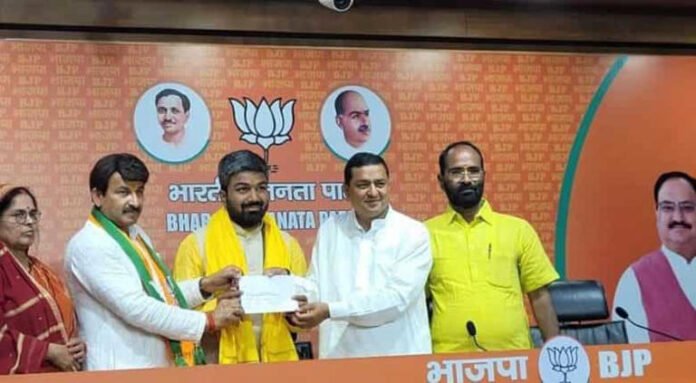The recent entry of YouTuber journalist Manish Kashyap into the political arena by joining the Bharatiya Janata Party (BJP) has sparked widespread interest and discussion. Kashyap, known for his outspoken commentary and investigative reporting on social media platforms, brings a unique perspective to the political sphere, raising questions about the evolving relationship between media and politics in the digital age.
Born and raised in a middle-class family in Uttar Pradesh, Manish Kashyap’s journey to prominence began with his foray into journalism through digital platforms. With a background in law and a keen interest in current affairs, Kashyap leveraged the power of social media to carve out a niche for himself as an independent journalist, focusing on issues ranging from politics and governance to social justice and corruption.
Kashyap’s rise to prominence as a YouTuber journalist reflects the democratization of media in the digital age, where individuals can bypass traditional gatekeepers and reach audiences directly through online platforms. His unfiltered commentary and investigative reports resonated with viewers disillusioned with mainstream media, earning him a loyal following and establishing him as a formidable voice in the public discourse.
However, Kashyap’s decision to join the BJP has raised eyebrows among both supporters and critics alike, prompting speculation about his motivations and the implications of his move for the media landscape and political discourse in India. Some view Kashyap’s entry into politics as a natural evolution of his activism, a logical extension of his commitment to driving social change and advocating for his beliefs. Others, however, question the integrity and independence of journalists who transition into partisan political roles, expressing concerns about conflicts of interest and compromised objectivity.
In his defense, Kashyap has maintained that his decision to join the BJP is driven by a desire to contribute to the party’s vision for the country and to work towards addressing the challenges facing Indian society. He cites his admiration for Prime Minister Narendra Modi’s leadership and the BJP’s commitment to development and nationalism as key factors influencing his decision. Kashyap also emphasizes the importance of journalists engaging with politics and bringing fresh perspectives to the table, arguing that his background in journalism equips him with valuable insights and skills that can benefit the political arena.
However, critics remain skeptical, questioning whether Kashyap’s transition from journalist to politician compromises the integrity and credibility of his reporting. They argue that journalists have a responsibility to maintain independence and impartiality in their work, and that entering partisan politics undermines the public’s trust in the media as a watchdog of democracy. Moreover, they caution against the blurring of lines between journalism and political activism, warning of the dangers of media manipulation and propaganda.
The debate surrounding Manish Kashyap’s entry into politics underscores broader questions about the role of media in shaping public opinion and influencing political discourse. In an era of disinformation and polarization, the integrity and independence of journalism are more crucial than ever, serving as bulwarks against authoritarianism and ensuring transparency and accountability in governance.
As Kashyap embarks on this new chapter in his career, navigating the complexities of politics and media, he faces a daunting challenge: balancing his role as a partisan actor with his responsibilities as a journalist committed to truth and integrity. Whether he succeeds in bridging this divide and making a meaningful impact in both spheres remains to be seen, but his journey serves as a reminder of the evolving nature of media and politics in the digital age.

